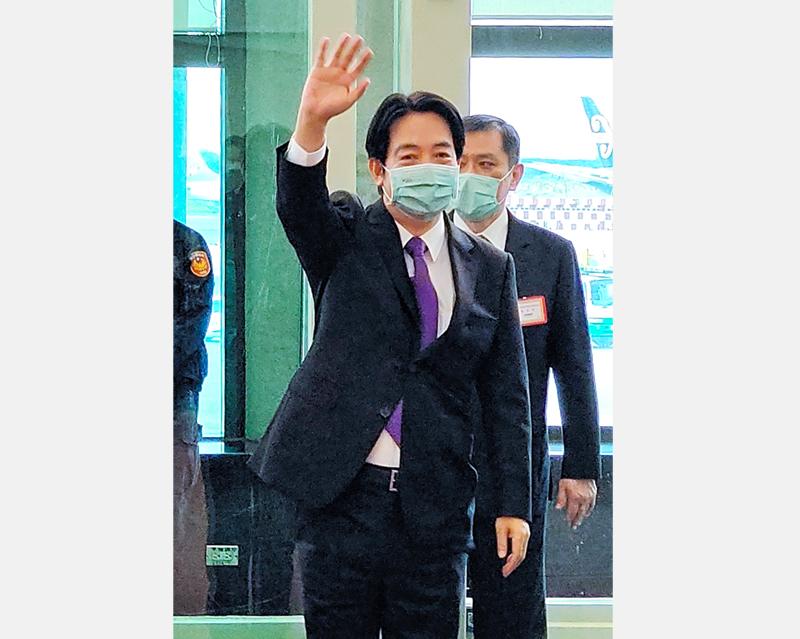Vice President William Lai (賴清德) yesterday left for Honduras via the US, saying that the visit shows Taiwan’s commitment to improving its relationship with the Central American ally.
Lai is leading a delegation on behalf of President Tsai Ing-wen (蔡英文) to attend the inauguration of Honduran president-elect Xiomara Castro. Lai is to return on Saturday.
Speaking at Taiwan Taoyuan International Airport before departure, Lai said that despite the COVID-19 pandemic, the delegation is traveling to Honduras to congratulate Castro and her incoming government, which shows Taiwan’s commitment to boosting bilateral ties and its support for the Central American nation.

Photo: Tony Yao, Taipei Times
He said the delegation would also donate medical aid to Honduras to help it fight the pandemic, without providing details.
“We will use concrete action and specific measures to show our support for deeper ties and the new government,” he said, adding that bilateral ties would continue based on pragmatism and reciprocity.
Describing Honduras as a key Central American ally for Taiwan, Lai said the two countries had gone through difficulties, and defied threats and enticements during eight decades of formal ties, while maintaining close and amicable relations.
Lai, who is to meet Castro today, said he would have “interactions and exchanges” with “leaders and deputy leaders” of allies and “friendly countries,” although he did not mention US Vice President Kamala Harris, who is also to attend the inauguration.
This is the first time that Lai is traveling overseas in an official capacity since taking office in May 2020.
Lai is to stop over in Los Angeles and San Francisco on the way to and from Tegucigalpa respectively, the Presidential Office said.
He is to spend more time in the US than in Honduras, his itinerary shows.
During the stopovers, he is to speak with US officials and politicians, as well as representatives of overseas Taiwanese communities, by telephone or videoconference, the office said.
Castro’s victory in the presidential election on Nov. 28 last year made her the first female president of Honduras, which established diplomatic ties with the Republic of China in 1941.
Castro, 62, is the wife of former Honduran president Jose Manuel Zelaya. Her victory had raised concerns in Taipei, as Castro had said during her election campaign that she would switch diplomatic recognition to China if she won.
However, two senior members of Castro’s transition team last month said that her government would maintain diplomatic ties with Taiwan.
Separately yesterday, Ministry of Foreign Affairs spokeswoman Joanne Ou (歐江安) told a news conference that the ministry has established good relations with the incoming Castro administration.
Taiwan would work closely with its ally to promote collaboration in areas that the incoming government has pledged to prioritize, such as economic recovery, education and public health, she said.
Additional reporting by Reuters

ROLLER-COASTER RIDE: More than five earthquakes ranging from magnitude 4.4 to 5.5 on the Richter scale shook eastern Taiwan in rapid succession yesterday afternoon Back-to-back weather fronts are forecast to hit Taiwan this week, resulting in rain across the nation in the coming days, the Central Weather Administration said yesterday, as it also warned residents in mountainous regions to be wary of landslides and rockfalls. As the first front approached, sporadic rainfall began in central and northern parts of Taiwan yesterday, the agency said, adding that rain is forecast to intensify in those regions today, while brief showers would also affect other parts of the nation. A second weather system is forecast to arrive on Thursday, bringing additional rain to the whole nation until Sunday, it

CONDITIONAL: The PRC imposes secret requirements that the funding it provides cannot be spent in states with diplomatic relations with Taiwan, Emma Reilly said China has been bribing UN officials to obtain “special benefits” and to block funding from countries that have diplomatic ties with Taiwan, a former UN employee told the British House of Commons on Tuesday. At a House of Commons Foreign Affairs Committee hearing into “international relations within the multilateral system,” former Office of the UN High Commissioner for Human Rights (OHCHR) employee Emma Reilly said in a written statement that “Beijing paid bribes to the two successive Presidents of the [UN] General Assembly” during the two-year negotiation of the Sustainable Development Goals. Another way China exercises influence within the UN Secretariat is

CHINA REACTS: The patrol and reconnaissance plane ‘transited the Taiwan Strait in international airspace,’ the 7th Fleet said, while Taipei said it saw nothing unusual The US 7th Fleet yesterday said that a US Navy P-8A Poseidon flew through the Taiwan Strait, a day after US and Chinese defense heads held their first talks since November 2022 in an effort to reduce regional tensions. The patrol and reconnaissance plane “transited the Taiwan Strait in international airspace,” the 7th Fleet said in a news release. “By operating within the Taiwan Strait in accordance with international law, the United States upholds the navigational rights and freedoms of all nations.” In a separate statement, the Ministry of National Defense said that it monitored nearby waters and airspace as the aircraft

Taiwan’s first drag queen to compete on the internationally acclaimed RuPaul’s Drag Race, Nymphia Wind (妮妃雅), was on Friday crowned the “Next Drag Superstar.” Dressed in a sparkling banana dress, Nymphia Wind swept onto the stage for the final, and stole the show. “Taiwan this is for you,” she said right after show host RuPaul announced her as the winner. “To those who feel like they don’t belong, just remember to live fearlessly and to live their truth,” she said on stage. One of the frontrunners for the past 15 episodes, the 28-year-old breezed through to the final after weeks of showcasing her unique